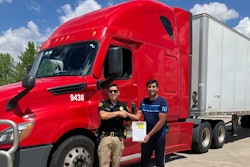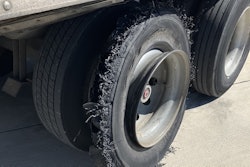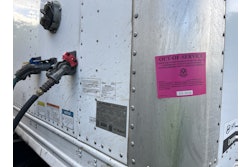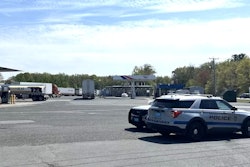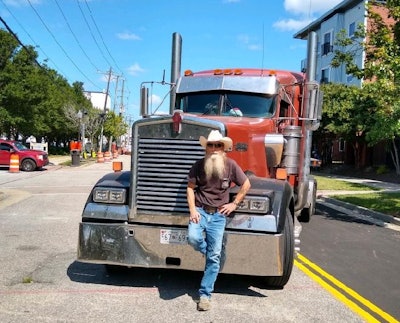
After a long, proud career in construction, the military, and then 27 years long-haul trucking, recently retired Eric Schmidt's ex-girlfriend said something to him that just about rung his bell.
"She started telling me about myself in a way I never thought about before," said Schmidt.
"You have no life. It's just you and your little dog in that truck. Everything else is second or third fiddle to you," she said.
Schmidt hadn't been driving for a few months at that point, but the decades on the road took a toll on him. He likened time at home to time at war but away from the front lines. "The house is nothing but a glorified truck stop to me," he said.
For 27 years a home life doled out in 34-hour resets, mostly spent mowing the lawn, reading maps and packing bags, had left a towering pile of unattended relationships. Now, in retirement, would that tower block out the sun on his golden years? Was it actually unstable enough to crush him?
"The house is nothing but a glorified truck stop to me"
"I took my job so intensely seriously that, unlike a lot of these new breed drivers, the ones with their feet up on the dashboard and in flip flops, the way I always operated, as soon as I came home from the road, the very first thing I would do is instantly prepare to leave again," he said.

For a former drill sergeant who had played out the last three decades in carefully executed campaigns, sprinting freight along the nation's highways and byways at a cool 73 mph with all the efficiency and autonomy conferred by paper logs, the woman's words were the punch that hurt worst -- the one you don't see coming.
"I was dumbstruck," said Schmidt. "What have I done to myself? To the people around me? How many people disappeared from my life as a result of this very myopic way that I operate?" He had never given it a "moment's thought," but now with time on his hands and nothing to really do besides build relationships, "it put me in reflection mode. The little 40-watt light bulb started going off."
That idea, accompanied by a bit of a gut-punch feeling, would stay with him for weeks, but in the immediate aftermath, he set out to warn others about the dangers of the trucking lifestyle when it's done seriously.
"I felt bad. I felt humbled. I felt embarrassed. I felt crushed," said Schmidt, recalling his ex-girlfriend's diagnosis. "I felt like I had deprived her of what she had originally signed up for. It's not like I could just sit there in some cavalier way and say, 'Oh jeez honey.'... It affected me tremendously and deeply, what she had to say."
Being a cautious and considerate citizen of trucking, though now divorced from his rig, he did the equivalent of getting on the CB and warning that down his route lay danger: He emailed me a bit of a rambling text entitled "Road Mode."
How Schmidt gave his soul to trucking
Not a day goes by in Schmidt's life where he doesn't think about "Road Mode" and the person he became through a disciplined life in trucking.
Mostly busy today around his house in Maryland doing some small construction projects and gardening, Schmidt is originally from the suburbs of Detroit. He's lived all over, but mostly settled in Maryland. He married young, having two daughters with a wife who stayed home as he worked various jobs. "In those days women didn't have to work," he said. "I come from a family of people in construction. I was following in my father’s footsteps. He's a homebuilder, but I just decided that, hey, I need to do something different to broaden my horizons."
He joined the Army, turning down a chance to go to helicopter flight school to become a drill sergeant.
This is as good a time as any to talk about who Schmidt is as a person, or how he saw himself. Schmidt is in fact friendly. He craves human contact like the rest of us. He's also very thoughtful and carefully spoken, not exactly like the barking drill sergeant who so bothered Private Pyle in "Full Metal Jacket."
"The yelling part is a little teeny tiny portion of what makes a good drill sergeant," said Schmidt. The drill sergeant program doesn't require a psychology or psychiatric degree, but "if you do the job correctly, with all you need to know about human behavior, you should be awarded one. You quickly learn to identify each person and judge their strengths and weaknesses and how to handle them."
Schmidt is "very much a people person. I thrive on interactions," he said.
But the one stereotype that really fit is the "extremely high level of personal discipline" he gained through drill sergeant training and the role itself.
After ten years in the army, served at the height of Cold War nuclear tensions between the United States and Soviet Union, Schmidt got out and went back to construction. One day, while working on "some lobbyist law firm on K Street" in Washington, D.C., a "solid piece of brass fell on me in the elevator."
Convalescing from the back injury, Schmidt figured "that's the end of that career" and recalled a time when he was young watching the Pennsylvania Turnpike getting renovated. "Passing time, watching the trucks go by," Schmidt realized that "somewhere deep inside me I always had this affinity for trucking, so I made up my mind to go do that."
The kids were older now, and he and the wife had parted ways. There was nothing between Schmidt and trucking, "Road Mode," what would become his new way of life.
On the road, Schmidt scratched that itch for human connection in old-school trucking fashion: On the CB, or at the coffee counter.
"The isolation part, the best way I could deal with that was to hit a truck stop and chat up whoever I could find around," he said. But "getting in my truck without a CB Radio is the equivalent of walking around Swanton, Vermont [one of his frequent stops in his OTR days] in February without a coat on."
The CB radio he calls "an absolute must" on the road, but unfortunately, it's "gone the way of the looney bird," said Schmidt, with other modes of communication and plenty cultural norms, not to mention the physical infrastructure that carried them. Witnessing firsthand his links to his fellow man, his fellow trucker, wither and die around him in the end accelerated his move from the business and into retirement.
"Truck manufacturers used to have hookups" for the CB built-in, he said. "Now a brand-new Freightliner Cascadia -- don’t even think about putting a radio in without jumping through mega hoops" to get the signal you likely want, an experience confirmed by Overdrive contributor Long Haul Paul with respect to the Cascadia he drives and its antenna system for both CB and AM radio reception, transmission.
[Related: A trucker's take on his fourth-gen 2025 Cascadia]
Schmidt recalls, and maybe you can too, a time when human communication in trucking served purpose and held meaning. "Before you had GPS and all this stuff, you picked up a load through a dispatcher from a shipper, and it came with directions," he said. "What most drivers would do is head over to the general area and ask for 'local.'"
Schmidt would blast on his CB: "Hey area, I need some local." Local operators "know where you're going and would steer you right into the gate. That's how business was done back then."
An "old sage" once told Schmidt "you only need three things to be a success in trucking: Common sense, a CB radio, and good maps." Schmidt had all three and thrived. He did it the old way, too, paying dues.
"I got a job with an excavating company hauling oversized right out of the gate in a 1971 Kenworth with an old clapped-out 13 speed and just shy of 1 million miles when I got the truck," he said. "I paid my dues by driving junk. Serious junk. Old Ford 9000s, old model Macks." Contrast that to many among today's entry-level drivers, stepping into some late-model Volvo or Freightliner pulling dry vans.
Schmidt did it all. Local, pickup and delivery, turf, even pulling doubles for FedEx. But he found his best success over-the-road, and the more success he found there, the less he found connection to home.
"You don’t run into this problem until you start driving over-the-road," said Schmidt. "Local guys can never relate. It’s the mindset that you have to have the level of preparedness and focus on the mission at hand. You can't escape that. You're pulling a 53-foot trailer driving a real long wheelbase KW with the turning radius of the Queen Mary. Get to where you're going correctly the first time or you could end up in deep kimchi."
Schmidt can count on one hand, with fingers left over, the number of times he wasn't on top of his game, but was another prize slipping out of his grasp the whole time?
How trucking impacts the human mind
The human mind builds pathways, relationships between facts, figures, faces, places, synapses, feelings, thoughts. We get to know each other. In Schmidt's "serious" approach to the road, he got to know the map.
"If I can respectfully suggest that all GPS does is kill brain cells," he said. "It prevents the innate ability to think and process information."
Schmidt never used GPS and cautions against it. Instead meticulously planning out every mile of every journey he'd ever gone on. He's seen firsthand the horrors of rookie drivers' bridge strikes and slammed chain truck stops when ample, free parking exists around the corner. Schmidt earned his trucking knowhow the old-fashioned way, with a map and the help of those who came before him.
On that point about GPS and brain cells, he might be right. A 2024 study from the British Medical Journal found taxi cab and ambulance drivers die from Alzheimer's disease at a much lower rate than the general population.
The study found those "two occupations had the lowest proportion of deaths from Alzheimer's disease of 443 occupations considered" and generally a larger hippocampus, or the part of the brain that deals with spatial awareness. In London, cab drivers must pass an exam where they verbally name every street they'd take to get from one part of town to another -- no GPS. Ambulance drivers, too, have to figure these things out on the fly. The study looked at a British population, where they don't have long-haul old-school cowboy GPS-free truck drivers like Schmidt. Nontheless we can probably assume he'd place pretty highly on their metrics of brain health.
Eventually Schmidt settled into the '05 Kenworth pictured at the top and below, a glider that he ran paper logs with. Those paper logs gave him the leeway to operate "efficiently," as he put it. Though he almost exclusively hauled for companies, never on his own authority, he had his pick of the litter when it came to hauling freight, mostly staying east of the Rocky Mountains up and down the U.S. and Canada.
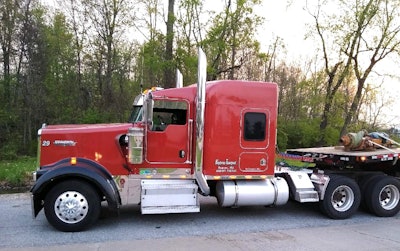 Profile view of Schmidt's 2005 Kenworth
Profile view of Schmidt's 2005 Kenworth
Success in trucking all those years gave Schmidt a solid income and a source of pride. Armed with nothing but his wits, the provisions he packed, and a pre-ELD Kenworth, he really lived the life out on the road.
"We are always on the job and in the truck," he said. "We eat and sleep trucking. It's a lifestyle that permeates our soul. You can't go to war for a month and take three days off and be normal over that break like everything is usual. No! You give up mode two," or anything other than "Road Mode" on the long haul that is a life over-the-road.
"Our life is being on the road. Once you spend many years, perhaps most of your adult life in trucking, you give up most hope of ever fitting in," with the general population, he said. "Trucking the right way has taken from you everything."
Schmidt never used a handle on the CB. He said he didn't need one: "Going down on I-40 in the middle of the night, nobody really knows you. Nobody is ever going to hear from you again."
The day Schmidt had enough with trucking
Those last few lines come from the email Schmidt shot off to me just hours after his ex floored him with her "Road Mode" revelation.
Schmidt never fell off. He never got fat, still weighing in at a slim 155 lbs. He kept plugging away at trucking until what was left of the society around him seemed to rot away.
A keen observer of trucking news, Schmidt's a regular Overdrive reader and consumed with interest the news about foreign drivers and English language proficiency as he increasingly found himself unable to communicate with the drivers that were supposed to be his peers.
One day, he sort of snapped.
At a Pilot Flying J stop on I-81 in Toms Brook, Virginia, Schmidt stopped to get fuel and finally decided he really had his fill.
Most of you have likely seen a driver take a 30 at the fuel pump, or fuel stops where people seem to speak everything but English, but Schmidt said he "was starting to scare myself with how upset I was getting at the way drivers are."
He encountered a "guy at a fuel island at Pilot," he said, someone from some place far away, who "walks into the building, maybe he needed a receipt, and he didn't bother pulling forward."
The driver "comes out with a Subway sub in his hand, climbs back in, climbs back in the sleeper, and commences to eat that sandwich."
Schmidt never sets a foot wrong. He plans his day to the minute. Imagine his disgust at someone who lacks the courtesy to simply move along and let him proceed with his day.
"I banged on his door," said Schmidt. "I told him if he didn't get his sorry @$$ out of the bunk and into the driver's seat, I was going to reach up and throw him down and stomp him out." It wasn't that this Subway customer had done anything so beyond the pale, more of just a "cumulative thing that I see all the time, a complete lack of respect" that woke him up to his new horizon: He was going to quit trucking.
"Is this really the type of life I want to live anymore?" he asked himself. "I put up with this anywhere I go. Honestly, and sadly, it's starting to take its toll on me.
"I made my decision to retire."
From then on, the "happiest minute of my day was when I talked to the nice lady at the counter" and told her "I have 23 days left to retire," he said.
In the last few days, he stopped into a CB shop, I-75, exit 56, Niota, Tennessee. "I pulled into a Pilot," he said, telling the guy behind the counter, like he had been telling everyone else, just a few more days until retirement.
The shop owner looked up and asked, "How long you been driving?"
27 years, Schmidt told him.
The man started laughing. "It's too much in your blood," the shop owner said.
"He was convinced," said Schmidt. "I listened to what he had to say, just kind if grinned at him and said, 'thank you,' but in my head, I thought 'Buddy, you have no idea.'"
Schmidt worked his "first paying job at 10 years old. I figure I have worked for somebody in some capacity or another for 50 years. I was ready to retire."
Yet, had it not been for the "complete absence of courtesy and respect" on the road today, maybe he would have hung around, he added. Now Schmidt spends his time fixing up the house and tending a garden at his house near Wilkesboro, North Carolina. While we spoke on the phone, a neighbor came by and Schmidt fetched some cucumbers for them.
Schmidt never reconciled with his ex. "She's a member of the Eric historical society now," he said. When we spoke, he likened his time retired from trucking to addiction withdrawal, painful pangs of craving the body emanates when it feels a powerful lack.
He can't change the past. His daughters now live in Europe -- one of them is estranged and "thinks I'm a total loser," he said. The ghosts of his past and what could have been reverberate through him the way trucking once did.
Maybe the CB shop owner was right. "There's a real good possibility that I’ll get back in a truck here maybe in another year," said Schmidt. If he does, though, it was good to pause, to think. To look at "Road Mode" in a sober new light, he said. "I really needed all this time to redirect my thinking, to let all the hostility and anger and disgust and frustration and whatever other words to seep out of me and to regain some normalcy. I needed more clarity and a better, clearer perspective.
"Only time does that," he said.
In the end, Schmidt's had a great run and seen it all. A father, a veteran, a damn proud trucker too. His only regret, perhaps, is having all the spacial awareness an enlarged hippocampus can fit, but perhaps not enough awareness of his own place in life. "If a driver is going to be susceptible to this sort of thing," Road Mode, that is, and its deleterious effects, he said, "he's got to be acutely aware of that susceptibility and anticipate that this is going to start to pervade your life."
A driver should "take steps to mitigate it that so you don’t start losing relationships, to be aware of the the toxic stuff" that will befall you, he said. Bring a loved one in the truck. Have your wife help with the business. Hug your children, catch a ball game. Take trucking seriously, but take home life seriously, too.
"If you want to be professional -- and if you want to be some jolly joker who moves onto masonry or whatever else -- but if you want to be a professional, this will require an extreme application of your life and energy," Schmidt said. "If you want to be the type of driver that everyone wants to be, if you don’t want to just be some seat warmer, steering wheel holder, the kind of driver where they say, 'We got this tough load so let's give it to this guy.' ... If that's the kind of driver you want to be, then be cognizant of what this is going to require of you."
If he could have done it all again, maybe that's where he'd bobbed where he should have weaved. "When you get home from the road, and you know your sweetie is going to be there, find a way to disengage yourself making it back to the house, back to the terminal," he said. "I should have started to unwind myself. I should have been somewhat of a person that wants to come home." In the end, you "don’t want to have as many years as I did before some woman comes along and lights up that bulb when it's too late."
Drivers, with the Road Mode brand of madness, "get out in front of it," Schmidt said. The road will always be there. It's not an opponent you'll drop, but one that can drop you in the late rounds if you're not aware.
Whatever Schmidt does next, he'll know he told his story. Drivers, you've been warned. Don't give it all over to Road Mode, and if you do, just know what you're leaving behind.

